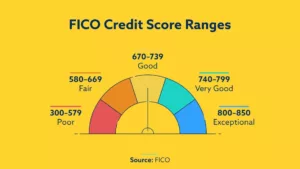Approximately 1 of 2 marriages ends in divorce, according to the most recent data from the Census Bureau. Divorce can be heartbreaking. It’s never easy when a marriage ends. Whatever the reason for the split, the breakup of a relationship can turn your whole world upside down.
But coping with your feelings is just one aspect of a divorce.
Joint accounts can create problems long after a marriage is over. If joint debt is not handled correctly both spouses can end up with damaged credit. If you applied together for an account such as credit cards, car loans, mortgages and other personal loans that means you share responsibility for the debts.
Divorce decree irrelevant to joint debt
Even though your ex-spouse may have agreed to pay a debt according to the divorce decree, it has no relevance to a lender. The divorce decree is an agreement between you and your ex-spouse but it does not expunge the original joint contract you had with the lender. Both spouses are still on the hook for the debt if you are a co-signer or joint applicant. A divorce decree has no legal impact on your contractual obligations.
What happens when an ex-spouse pays late on accounts
If you have an agreement for an ex-spouse to pay a bill and that bill is paid late it will impact your credit scores. The account is still yours until it is paid off. A creditor may agree to remove the late payment from the innocent spouse’s credit report, but may require that it be paid off first. And, keep in mind the lender is allowed to go after you for the debt and report the delinquency on your credit reports.
Separate your financial affairs
To prevent future obligations for joint debt, close joint accounts such as checking, lines of credit, credit cards – and establish individual ones. The bank may require you to pay off all balances before opening new accounts but at least you can prevent an ex-spouse from adding any more charges you will be jointly responsible for paying.
Prevent damaged credit
If you have the funds to pay on joint accounts, in the name of protecting your credit, do not wait for the ex-spouse to make payments according to a divorce decree. Pay the bill then go after the ex for the money. Don’t jeopardize your credit scores if you don’t have too. Make sure to make at least the minimum payments on joint credit card bills while you are in the process of closing/freezing joint accounts. Even one late payment can affect your FICO score. Mortgages are harder to resolve, because it requires refinancing to remove you or your ex-spouse's name from the home loan but you may be able to pay other joint obligations on your own.
Rebuilding damaged credit
It’s unfortunate that courts do not have the authority to make banks abide by a judge's orders in a divorce. If the damage has been done already, there are some steps to take to rebuild credit:
- Dispute any mistakes or errors on your credit report.
- Make sure to establish good credit in your name only, even if you have to start with a secured credit card. Get more information on how to add positive credit.
- Contact the joint creditor if there have been late payments and request the negative information be removed. The creditor is not obligated to remove accurate information but it never hurts to ask. Plead your case. Let them know the ex-spouse promised to pay the obligation according to the divorce decree and that you were under the impression the debt was being paid on-time. The creditor may show some goodwill, especially if you offer to bring an account current, and agree to delete the negative information from your credit reports. If an agreement is struck make sure you get it in writing.
- Hold on to hope. After seven years, bad credit is deleted from your credit reports. But in the meantime, credit scoring weighs recent good credit more favorably than aging bad credit, so make sure more positive information is on your credit reports than negative.











